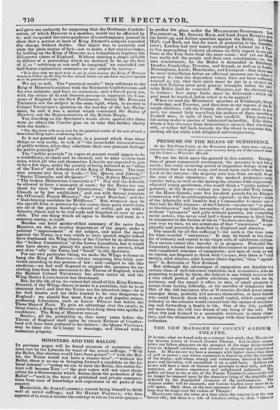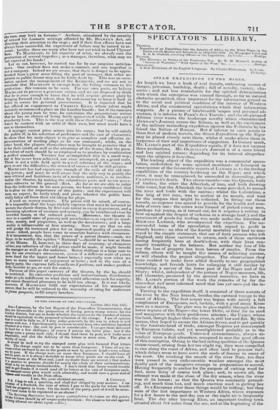THE NEW MANAGER OF COVENT GARDEN/ THEATRE.
IT is true, what we heard only as a rumour last week, that MACREADY has become lessee of Covent Garden Theatre. Let us then congra- tulate our fellow playgoers on the prospect of the stage being rescued from its debased condition, and restored to decency and propriety at least. In MACREADY we have a manager with higher views than those of pelf or power ; one whose reputation is bound up with the interests of the drama ; and whose energy and enthusiasm, directed by intelli- gence and liberality, will reestablish it on a solid basis. Authors and actors will have a man of honour and principle to deal with, and ane: moreover, of mature experience and enlightened judgment. The public (at least so far as one of the Patent Theatres is concerned) will no longer be imposed upon by the shameless lying of the playbills, sickened by the disgraceful character of the performances. ' nor Dv Attgean stable will be cleansed ; and Covent Garden once more he it- self again. Hail, then, to the new successor of JOHN KEMBLE ; and long may he reign over the realms of Thespis ! MACREADY takes the reins at a time when the concern is at the very lowest ebb; but there is a tide of intellect setting in, that, " taken at
he
lea:f to fortune." Authors, stimulated by the security of turn. may f reward for 4ramatic writings afforded by Mr. BULWER.8 Act, are directing their attention to the stage ; and if their first efforts have not always been successful, the experience of failure may be turned to ac- count : besides, there are many who have not yet tried to bend Ulysses' bow.
To MACREADY, H ' i his capacity of actor, we already owe the production of several tragedies ; as a manager, therefore, what may we xot expect at his hands ! Let us not, however, be carried too far by our sanguine anticipa- tions. One swallow does not make a summer, and one tragedian is net a company. Indeed we are aware, that there is danger to be appre- hended from a great actor filling the post of manager, that other as- pirants to public favour may not be fairly dealt by. This was an accu- sation against the management of the "KEMBLES; and we are not to conclude that Maciteany is exempt from the failing common to his profession : this remains to be seen. For our own parts, we believe MACREADY to possess a genmous nature, and we are disposed to think that he is wise enough to know that he will acquire greater glory by bringing forward rival talent, than by endeavouring to keep it back in order to secure his personal preeminence. It is repotted that he has offered an engagement to CHARLFS KEAN, whose talent ought certainly to command a place on the London boards : but if dm rumours about this young man be true, he entertains the preposterous notion that he has no chance of being fairly appreciated while MACREADY'S popularity lasts. This is the way with these theatrical " stars ; " they won't be content with an orbit of their own, but must needs have is sun to themselves. A manager cannot press actors into his corps ; but he will satisfy the public if, in his selection of performers and the cast of characters, be show that his main object is to give as complete and effective re-
presentations of sterling plays HS he can co lllll land ; while, on the
other hand, the players themselves may be brought to perceive that it is for their credit, RR well as the advantage of the drama, that the pecu-
liar talent of each should be so employed as to produce by combination perfect ensemble. VESTRIS hits accomplished this in a small way; hat it has never been achieved, nor even attempted, on a grand scale. There is yet a wide field open to a real reformer of the stage ; and great as are the difficulties, the reward of success will be still greater. MaciteaDv has had experience enough of the evils of the old star. ring iystem ; and must be well aware that the only way. to gratify the more critical and fastidious taste of a modern audience, is to intellec- tualize the theatre, by making the subordinate parts mid scenic acces- sories subserve to the general ffect. As far as we are able to judge from the indications in his own person, we have every confidence that be is alive to the importance of this point ; and the experiment will now, we expect, be fairly tried, and prove whether the public have really fallen off from their old liking for plays. A word on money matters. The prices will be raised, of course. It is impossible that the large nightly expense that must be incurred to sustain the classic drama, by first-rate talent in every department, and a becoming splendour of costume and scenery, can be reimbursed even by crowded houses, at the reduced prices. Moreover, the theatre is now in a squalid state of poverty and wretchedness, us regards its ward- robe, scenery, and properties, as well as the decorations; and a large outlay is indispensable at first starting. Sure we are that no one will grudge the increased price for an improved quality of entertain- ments: indeed, people have come to associate badness with cheapness. It is inconsistent, too, that the prices of a patent theatre—soon, we hope, to be worthy the epithet " National"—should be as low as those of the Minors, If, however, in these days of economy, or cheapness either, any reduction of the old prices could be made, it might benefit the manager as well as the audience. Seven shillings is a large sum to pay for one evening's amusement, (even if a different scale of prices were fixed for the upper and lower boxes,) especially now when we have so many sources of enjoyment at home ; and in the case of a family party, the expense falls heavily on ii padrone, and makes prudent folks hesitate to go, or wait for orders. The issue of this paper currency of the theatre, by the by, should be restricted. Its excessive profusion and indiscriminate distribution snake people indifferent to what they would otherwise seek fur eagerly, and causes theatrical pleasures to be held too cheap. It is not likely, however, if MACREADY fulfil our expectations of his managerial career, that he will be reduced to the necessity of suing for audiences inform pauperis, to fill empty benches.



























 Previous page
Previous page